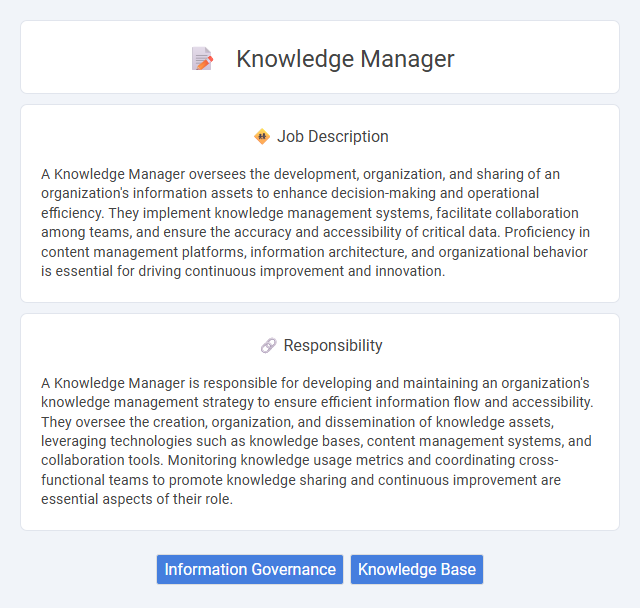
A Knowledge Manager oversees the development, organization, and sharing of an organization's information assets to enhance decision-making and operational efficiency. They implement knowledge management systems, facilitate collaboration among teams, and ensure the accuracy and accessibility of critical data. Proficiency in content management platforms, information architecture, and organizational behavior is essential for driving continuous improvement and innovation.
Individuals with strong analytical skills and a passion for organizing information are likely to thrive as Knowledge Managers. Those who are comfortable collaborating across departments and managing digital knowledge systems may find the role particularly suitable. People who prefer routine tasks or limited interaction might have challenges adapting to the dynamic and interdisciplinary nature of this position.
Qualification
A Knowledge Manager typically requires a bachelor's degree in information management, library science, or a related field, with many roles preferring a master's degree. Strong proficiency in knowledge management systems, data analysis, and content management platforms is essential. Effective communication skills, project management experience, and expertise in information architecture and organizational learning further qualify candidates for this role.
Responsibility
A Knowledge Manager is responsible for developing and maintaining an organization's knowledge management strategy to ensure efficient information flow and accessibility. They oversee the creation, organization, and dissemination of knowledge assets, leveraging technologies such as knowledge bases, content management systems, and collaboration tools. Monitoring knowledge usage metrics and coordinating cross-functional teams to promote knowledge sharing and continuous improvement are essential aspects of their role.
Benefit
A Knowledge Manager likely improves organizational efficiency by systematically capturing and sharing information, reducing redundancy and enhancing decision-making. They help foster a collaborative culture, which probably leads to increased innovation and employee engagement. Employing a Knowledge Manager may result in faster onboarding processes and better retention of critical expertise.
Challenge
Knowledge Manager roles often present the challenge of integrating diverse information sources into a coherent system while maintaining accuracy and accessibility. Balancing the need for innovation with organizational constraints may require navigating complex stakeholder relationships and technological limitations. Managing the ever-growing volume of data could necessitate continuous adaptation to evolving knowledge management tools and methodologies.
Career Advancement
A Knowledge Manager plays a critical role in organizing, sharing, and optimizing organizational knowledge to enhance decision-making and innovation. Career advancement in this field often leads to strategic roles such as Chief Knowledge Officer, Director of Knowledge Management, or Information Governance Manager, where professionals drive enterprise-wide knowledge initiatives. Mastery of knowledge management systems, data analytics, and cross-functional collaboration significantly boosts promotion potential and leadership opportunities.
Key Terms
Information Governance
A Knowledge Manager specializing in Information Governance develops and enforces policies to ensure data accuracy, security, and compliance across the organization. They coordinate data lifecycle management, including classification, retention, and access controls, to mitigate risks and support regulatory requirements such as GDPR and HIPAA. Expertise in information architecture and metadata management enables the optimization of knowledge assets for efficient retrieval and decision-making.
Knowledge Base
A Knowledge Manager oversees the development and maintenance of a comprehensive Knowledge Base to ensure accurate, up-to-date information is readily accessible across the organization. They implement strategies for content curation, taxonomy, and user engagement to optimize knowledge retrieval and facilitate efficient decision-making. Effective management of knowledge assets directly enhances collaboration, reduces redundancy, and supports continuous learning within the company.
 kuljobs.com
kuljobs.com